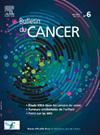Mise à jour des recommandations pour le choix des unités de sang placentaire en greffe de cellules souches hématopoïétiques (SFGM-TC)
IF 1.1
4区 医学
Q4 ONCOLOGY
引用次数: 0
Abstract
L’évolution des pratiques et l’utilisation plus limitée des unités de sang placentaire (USP) comme source de cellules dans le cadre des allogreffes de cellules souches hématopoïétiques (CSH) nous amènent à reconsidérer les recommandations établies en ateliers de 2011 et 2012, et à proposer une mise à jour intégrant les données bibliographiques récentes. Si la compatibilité HLA était jusqu’à présent établie en basse résolution pour les loci HLA-A et B, et en haute résolution pour le locus HLA-DRB1, les revues convergent aujourd’hui vers une hausse du niveau de résolution, faisant place à une compatibilité dorénavant définie en haute résolution pour l’ensemble des loci considérés, et l’inclusion du locus HLA-C, afin d’établir un niveau de compatibilité HLA sur huit allèles (loci HLA-A, B, C et DRB1). La dose de CD34+ est un facteur déterminant dans la reconstitution hématopoïétique mais elle n’est pas corrélée au contenu en cellules nucléées totales (CNT). C’est pourquoi nous recommandons de prendre en compte ces deux données lors du choix d’une USP. Les recommandations établies par notre groupe sont présentées sous forme d’un logigramme décisionnel qui prend en compte les caractéristiques de la pathologie (maligne ou non maligne), la dose de cellules et les critères de compatibilité HLA, ainsi que des critères liés aux banques dans lesquelles sont stockées les unités.
Changing practices and the limited use of cord blood units as a source of cells for allogeneic hematopoietic stem cell transplants (HSC) led us to reconsider the recommendations established in 2011 and 2012, and to propose an update incorporating recent bibliographic data. If HLA compatibility was until now established at low resolution for HLA-A and B loci, and at high resolution for HLA-DRB1, the recent papers are converging towards an increase in the level of resolution, making way for a compatibility now defined in high resolution for all the considered loci, and the inclusion of the HLA-C locus, in order to establish a level of HLA compatibility on 8 alleles (HLA-A, B, C and DRB1). The CD34+ dose is a determining factor in hematopoietic reconstitution but it is not correlated with the total nucleated cells content. This is why we recommend taking these two data into account when choosing a cord blood unit. The recommendations established by our group are presented as a flow chart taking into account the characteristics of the underlying pathology (malignant or non-malignant), the cell dose and the HLA compatibility criteria, as well as criteria linked to the banks in which units are stored.
[造血干细胞移植中脐带血单位选择的更新(SFGM-TC 研讨会)]。
脐带血作为异基因造血干细胞移植(HSC)的细胞来源,其使用方法不断变化,使用量有限,这促使我们重新考虑2011年和2012年提出的建议,并结合最新的文献数据提出更新建议。迄今为止,HLA相容性是以低分辨率确定HLA-A和B位点,以高分辨率确定HLA-DRB1位点,而最近的论文则趋向于提高分辨率,以高分辨率确定所有考虑位点的相容性,并纳入HLA-C位点,从而确定8个等位基因(HLA-A、B、C和DRB1)的HLA相容性水平。CD34+ 剂量是造血重建的决定性因素,但它与有核细胞的总含量无关。因此,我们建议在选择脐带血单位时将这两个数据考虑在内。我们小组制定的建议以流程图的形式呈现,其中考虑了潜在病理特征(恶性或非恶性)、细胞剂量和 HLA 相容性标准,以及与储存单位所在血库相关的标准。
本文章由计算机程序翻译,如有差异,请以英文原文为准。
求助全文
约1分钟内获得全文
求助全文
来源期刊

Bulletin Du Cancer
医学-肿瘤学
CiteScore
1.90
自引率
16.70%
发文量
224
审稿时长
37 days
期刊介绍:
Without doubt, the ''Bulletin du Cancer'' is the French language publication of reference in the field of cancerology. Official organ of the French Society of Cancer, this journal covers all the information available, whether in the form of original articles or review articles, but also clinical cases and letters to the editor, including various disciplines as onco-hematology, solids tumors, medical oncology, pharmacology, epidemiology, biology as well as fundamental research in cancerology. The journal proposes a clinical and therapeutic approach of high scientific standard and regular updates in knowledge are thus made possible. Articles can be submitted in French or English.
 求助内容:
求助内容: 应助结果提醒方式:
应助结果提醒方式:


